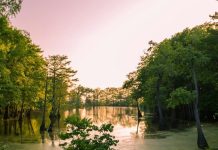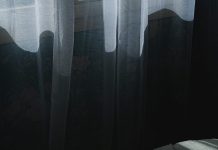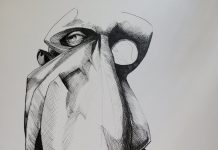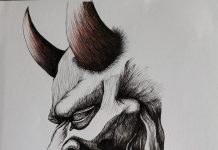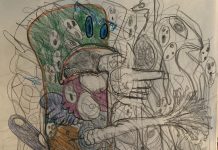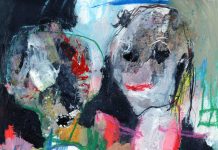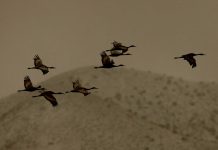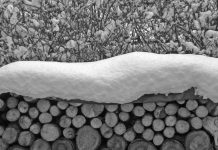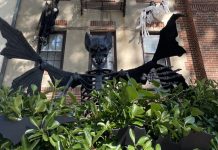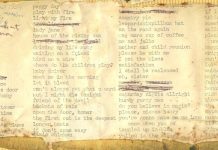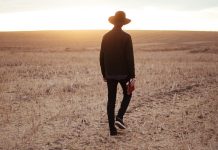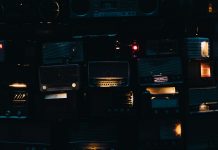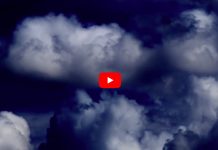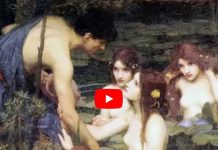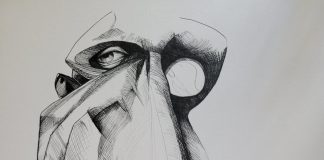I flung out of the loose cottage and stood on the ragged path the door beating shut behind me. There was a birch forest across the lake my eyes went there first and then to a couple of fishing boats like obstacles they appeared to be suspended in the wet blur. It always smelled of cedar in the mornings, green fronds like hands had come to the ground overnight, a result I supposed of the battles I heard from my bed the grunts and hisses like the factory beside our house, I wondered where the casualties were but it was seeped and peaceful instead, hidden and healed.
It was barely dawn nobody else was up I saw a flicker of light through the trees and thought maybe Jenny but the light was brief so I started to the dock invisible in the fog it was only the curve of rope I could see that connected canoe to dock and I thought in an if-a-tree-falls-in-a-forest moment of the dock not being there at all, nor the canoe, the birch forest a mirage, the lake itself gone from beneath the diminishing blur, the rock stairs missing, the empty summer that dangled in front of me suddenly unavailable, I felt myself disintegrate along with the entire morning as if I were dreaming or were perhaps a ghost or even dead, and then with all the colours and every shape at once I remembered Tom was coming today – how could I have forgotten? – and just then the round shapes of headlights it was him already, the fog fell away in chunks and I ran hot to his car he had his serious face on until he saw me and smiled.
Jesus Hailey you scared me he said through the window then he got out and onto his knees right away he hugged me and I mean talk about shapes and colours it was like an explosion.
We whispered things about the sunrise, the fishermen, there was a stark clarity – I think for a moment when the fog clears it clears too well we see things too precisely, too explicitly – he said I love that birch forest and I said me too my voice a little rocky. We walked to the dock side by side, conjoined we stepped onto it and jostled to the end where the canoe was orange twice in the sunrise, Tom waved at the fishermen I noticed his paint-smudged hands, the men waved back their swimming reflections, one of them started motoring slowly at first like a zipper across the lake, I heard the cottage door beat and leaned into my brother and then her voice Tom! she said and Tom looked down at me put his hand on my shoulder and said go get us some worms we’ll go fishing later.
I went inside and grabbed a can of orange crush popped it in a rubber boot a spade in the other I threw everything in the canoe and skirted the shoreline looking for congregations of birds, I pulled over opened the can of pop which again sounded like the factory, it scared the cranes they swooped away but the smaller birds only continued their sway on the bullrushes, I pulled on my boots and in no time I had enough worms.
Sound travels she was furious, she used the word irresponsible I heard my father clear his throat but he said nothing she aways did the talking he was afraid of her I think and didn’t say what he thought, instead he took whatever she said and rearranged it and said it as if it came from somewhere other than his mouth but it didn’t, we never knew what was in his heart or mind until he got drunk at night, every night, and he’d bring up with enormous recall and clarity, almost like the morning when it gave you too much, he’d examine out loud every little thing, one sip at a time.
She was our step mother and I don’t want to get all Cinderella about it she was fine, courteous, detachable. I knew just how to ruffle her feathers and I knew precisely how not to, child’s play really, but my specialty was the way I suddenly quit at the peak of her outrage, absolutely collapsing that which rose her ire in the first place – did I mention we had a chicken ranch? – the hens were always walking around like that in an embarrassingly over-the-top uncalled for rage.
It is also difficult to love a chicken.
She might catch me idle in the coop, Florentine or Lorraine on my lap and tell me as if I didn’t know all the work I had to do before sunset the chickens so sensitive they’d feel me reacting and in response they’d get agitated too, spill from my lap and in a most undignified way they’d speed around the coop like the idiom but with their heads still on, the laying hens were my responsibility, every morning I bundled the eggs into worn cardboard cartons, I could tell the double-yolked ones and saved two a day for my grandparents, the beautiful little blues from Flo and Rainy I put in our own fridge they were too small for customers.
The cottage was my grandparents’ on my mother’s side but they didn’t use it so on weekends in the summer we drove up, I got my friend Casey to collect the eggs and feed and water my brood, the only person for miles around up there was Jenny next door she was older than me, more Tom’s age but we were best cottage friends, the criteria for cottage friendships infinitely lesser.
Anyway I overheard from the canoe Tom said how he was going to quit school, he had a scholarship and went to McGill in Montreal for mechanical engineering, he said what he didn’t hate about it he loved.
What’s there to hate? my father was okay with questions.
That’s it right there Tom said you should have asked what’s there to love.
Be careful what you’re good at Tom told me so many times he said otherwise I’d get sent to university at 17 like what had happened to him.
He was the youngest in all the classes, the only one who couldn’t drink, the girls found him adorable but their boyfriends disliked him, his artistic abilities so foreign to them, the drawings in his notebook, the music he loved, he was not one of them, no fraternity on earth could have him, he was the only of the engineering students who took other classes at night, for he did not study like the others, they saw him through dark windows dip his paintbrush, press an oboe between his lips, try out for the part of Stanley Kowalski, he modelled for cash in the life drawing classes, he wore corduroy that smelled of the countryside, and it was of diminishing interest that he knew math so well and so immediately, much more importantly he admitted with a tender brow that he had never had a girlfriend.
Be careful he warned again and again sometimes in person but usually over the phone one province away. So I was careful. The teachers looked at me hard for signs – Tommy was famous for his intelligence, his intuition, the way he got to answers before the question had time to land – but I was an enormous disappointment, a dullard, I read only Trixie Beldons, I made mistakes in basic math, I placed i before e whenever I wished.
Only at home did I read Paper Moon and Gatsby and To Kill A Mockingbird, I played chess and won, I learned piano without learning, I memorized the constellations, I knew King Lear by heart.
Tom moved home every summer but that summer was different, there was a permanence about it, he worked on the farm as usual, took art classes and accepted acting roles at the community centre, and in July he re-introduced cattle to the farm after maybe ten years, in August he bought three llamas, my step mother said he was ccrazy, and he worked evenings at the factory next door. He came to the cottage only a few Saturdays he always brought watercolours, and not canvas but thick paper we’d go off any direction far as we liked and it was always the birch forest he painted, so different from fresh angles, accompanied by the velocity of new light.
When he met Jenny everything changed and in the autumn there wasn’t any question, it seemed as if there’d never been a university at all.
Tom and Jenny eventually took over the farm.
I went to the same university in Montreal, won the same scholarship, took the same mechanical engineering course – and when the professors eyed me up I showed them what I was capable of – I posed nude for the artists in the life drawing classes, I played violin in the orchestra the staccato plucking made me think of my chickens at home.

